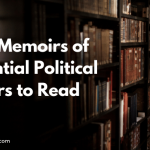Introduction
Memoirs offer a unique glimpse into the lives of remarkable individuals who have shaped history. They allow readers to connect with the personal experiences and challenges faced by these figures, providing deeper insight into their motivations and the events that defined their lives. In this article, we’ll explore seven must-read memoirs from historical figures whose stories resonate with readers around the world. Each of these works not only tells a compelling story but also sheds light on significant cultural and societal issues.
“The stories we tell ourselves and each other are the threads that weave our lives into a larger tapestry of history.”
1. “The Diary of a Young Girl” by Anne Frank

Anne Frank’s diary is a poignant and heartbreaking account of a young Jewish girl hiding from the Nazis during World War II. Written from 1942 to 1944, this memoir captures Anne’s thoughts, dreams, and fears as she navigates adolescence in the confines of a secret annex in Amsterdam.
Anne’s writing is both relatable and profound, offering insights into the human spirit’s resilience in the face of adversity. Her reflections on identity, hope, and the desire for freedom continue to touch hearts today. The diary has been translated into more than 70 languages and remains a vital part of Holocaust education.
“In spite of everything, I still believe that people are really good at heart.” — Anne Frank
Learn more: Anne Frank House
2. “Long Walk to Freedom” by Nelson Mandela

In “Long Walk to Freedom,” Nelson Mandela chronicles his journey from rural boyhood to becoming South Africa’s first Black president. This memoir is not only a reflection of Mandela’s life but also a powerful narrative about the struggle against apartheid and the fight for justice and equality.
Mandela’s storytelling is both captivating and inspiring, revealing the sacrifices he made for his beliefs and the deep love he held for his country. This book serves as a reminder of the importance of perseverance and the impact one individual can have on the world.
“It always seems impossible until it’s done.” — Nelson Mandela
Learn more: Nelson Mandela Foundation
3. “The Autobiography of Malcolm X” by Malcolm X and Alex Haley

Co-written with journalist Alex Haley, this autobiography provides an intimate portrayal of Malcolm X’s life, from his troubled childhood to his emergence as a prominent civil rights leader. His candid reflections on race, identity, and social justice resonate powerfully in today’s context.
Malcolm X’s fierce commitment to the struggle for Black empowerment and his evolving views on race and religion make this memoir essential reading for anyone interested in understanding the complexities of the civil rights movement.
“You can’t separate peace from freedom because no one can be at peace unless he has his freedom.” — Malcolm X
Learn more: The Malcolm X Project
4. “I Know Why the Caged Bird Sings” by Maya Angelou

Maya Angelou’s groundbreaking memoir details her childhood and early adulthood, offering a candid look at racism, trauma, and resilience. Her lyrical prose paints a vivid picture of her experiences, from growing up in the segregated South to finding her voice as a writer and activist.
This memoir is not just a reflection of personal struggles; it is also a tribute to the strength of women and the importance of embracing one’s identity. Angelou’s wisdom and eloquence continue to inspire generations.
“There is no greater agony than bearing an untold story inside you.” — Maya Angelou
Learn more: Maya Angelou Official
5. “The Story of My Experiments with Truth” by Mahatma Gandhi

Mahatma Gandhi’s autobiography is an exploration of his philosophy of non-violence and truth. It details his life, thoughts, and the principles that guided him in his quest for Indian independence. Gandhi’s narrative reflects his spiritual journey and the evolution of his beliefs.
Through his experiments with truth, Gandhi invites readers to consider the role of ethics and morality in personal and political life. This memoir is a profound testament to his legacy and the impact of peaceful resistance.
“You must be the change you wish to see in the world.” — Mahatma Gandhi
Learn more: Gandhi Heritage Portal
6. “Becoming” by Michelle Obama

In her memoir, Michelle Obama shares her journey from the South Side of Chicago to becoming the First Lady of the United States. “Becoming” is a candid and inspiring exploration of her personal and professional life, touching on themes of identity, family, and public service.
Through her relatable storytelling, Michelle offers insights into the challenges she faced and the lessons she learned along the way. Her message of empowerment and authenticity resonates strongly, making this memoir a must-read for anyone looking to embrace their own journey.
“Your story is what you have, what you will always have. It is something to own.” — Michelle Obama
Learn more: Michelle Obama Official
7. “Born a Crime” by Trevor Noah

Trevor Noah’s memoir recounts his experiences growing up in South Africa during apartheid. The title refers to his very existence as the son of a Black mother and a white father, which was illegal at the time. Noah’s humor and wit shine through as he navigates complex social issues, family dynamics, and his unique identity.
“Born a Crime” is both hilarious and poignant, offering a fresh perspective on race and resilience. Noah’s ability to find humor in difficult situations makes this memoir an engaging and enlightening read.
“I learned that there’s no such thing as a ‘no-no’—it’s just a ‘yes’ waiting for you to find it.” — Trevor Noah
Learn more: Trevor Noah Official
Conclusion
These seven memoirs provide invaluable insights into the lives of historical figures who have shaped our world. Each story is unique, yet they all share themes of resilience, identity, and the pursuit of justice. Whether you’re a history buff or simply looking for a good read, these memoirs are sure to inspire and educate.
“Books are a uniquely portable magic.” — Stephen King
FAQs
Q: Why are memoirs important for understanding history?
A: Memoirs provide personal perspectives that enrich our understanding of historical events, allowing readers to connect emotionally with the experiences of individuals who lived through those times.
Q: Can memoirs be considered reliable historical sources?
A: While memoirs offer valuable insights, they are subjective and should be read alongside other historical sources for a more comprehensive understanding of events.
Q: Are there memoirs from historical figures outside the United States?
A: Yes, many historical figures from around the world have written memoirs that reflect their unique experiences and cultural contexts.
Q: How can I find more memoirs by historical figures?
A: Check your local library, bookstores, or online platforms like Goodreads for recommendations and reviews of memoirs by historical figures.
Explore these incredible stories and discover the lives behind the legends! Happy reading!
Also Look For:
For further reading on influential literature, you might explore classic memoirs and autobiographies that shaped society, such as those highlighted in the following articles:



